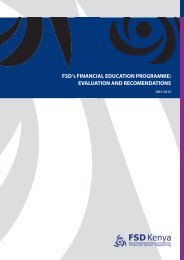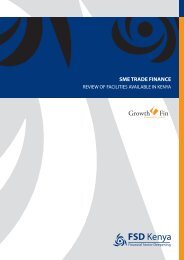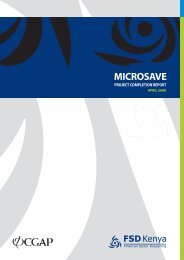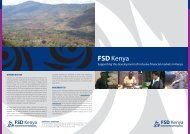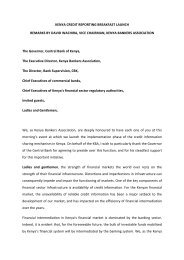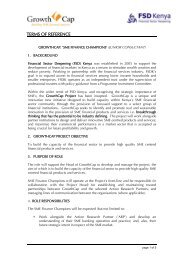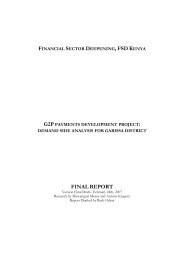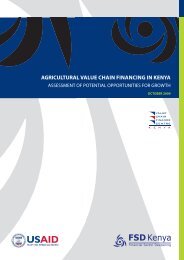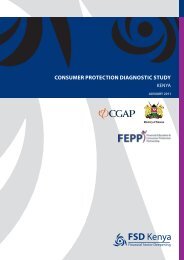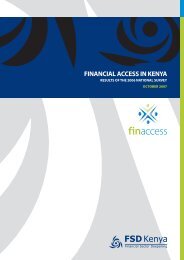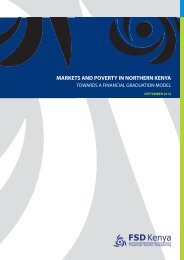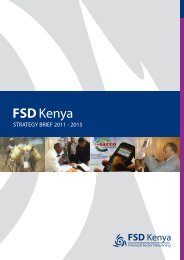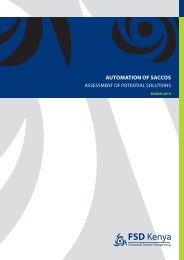2009 - FSD Kenya
2009 - FSD Kenya
2009 - FSD Kenya
Create successful ePaper yourself
Turn your PDF publications into a flip-book with our unique Google optimized e-Paper software.
develop a clearer common understanding of the possible futures for the retail<br />
financial landscape in <strong>Kenya</strong>, CBK and <strong>FSD</strong> launched a scenario building process<br />
involving leaders from the financial and related sectors. Linking to a similar<br />
global exercise led by the Consultative Group to Assist the Poor (CGAP) and<br />
DFID, the process seeks to address the question: ‘How can government and the<br />
private sector most affect the uptake and usage of branchless banking among<br />
the un-served majority in <strong>Kenya</strong> by 2020?’ The process is due to complete<br />
during 2010, including the dissemination of the conclusions reached.<br />
The regulatory framework<br />
Following the passage of a new law to regulate SACCOs in late 2008, the<br />
effort switched to developing the required regulations and moving towards<br />
the establishment of a new Sacco Societies Regulatory Authority (SASRA).<br />
<strong>FSD</strong> provided support to the joint Government-industry Task force established<br />
to undertake this work. By the end of the year a full draft of the regulations<br />
had been produced and the Government had appointed SASRA’s board. CBK<br />
moved forward on implementation of the new regulatory framework for<br />
deposit-taking micro-finance institutions (DTM), licensing the first institution<br />
– Faulu DTM. A letter of intent was provided to a second institution – <strong>Kenya</strong><br />
Women Finance Trust (KWFT). The industry association, AMFI, convened a<br />
workshop with <strong>FSD</strong>’s assistance, to share the lessons from these pioneering<br />
transformations with other MFIs.<br />
Amendments to the Banking Act allowing banks to make use of agents were<br />
included in the <strong>2009</strong> Finance Bill which passed into law at the end of the<br />
year. In order to guide the development of new guidelines to regulate the<br />
use of agents under the legislative amendment and re-examines the role<br />
of branches, CBK and <strong>FSD</strong> commissioned a study into the policy options for<br />
future regulation of commercial banking channels. This work looked carefully<br />
at relevant evidence from around the world, examining the overall impact on<br />
access and risk of various approaches and the way in which oversight has been<br />
implemented.<br />
Increasing financial capabilities<br />
There is growing recognition of the importance of the demand-side to propoor<br />
market development. Simply making more appropriate financial services<br />
available does not inevitably lead to positive impacts on people’s livelihoods.<br />
Users must be able to make good, well informed choices. Evidence from<br />
FinAccess <strong>2009</strong> showed that many people in <strong>Kenya</strong> lack understanding of even<br />
basic financial concepts. The Financial Education Partnership (FEP), launched<br />
the year before with encouragement from <strong>FSD</strong>, seeks to build the financial<br />
capabilities of <strong>Kenya</strong>ns through appropriate financial education initiatives<br />
(discussed in more detail in box 1).<br />
Making the right choices also depends on having the right information on<br />
financial services. Easily understood information on pricing is crucial. At<br />
present <strong>Kenya</strong> lacks a standard interest rate measure to allow ready comparison<br />
<strong>FSD</strong> KENYA <strong>2009</strong> ANNUAL REPORT • 11<br />
Amendments to the Banking Act in the <strong>2009</strong> Finance Bill which passed into<br />
law at the end of the year allows banks to use small shops, petrol stations,<br />
pharmacies and other retail outlets as agents. This could have a dramatic<br />
impact on improving access to financial services, especially in rural areas.



